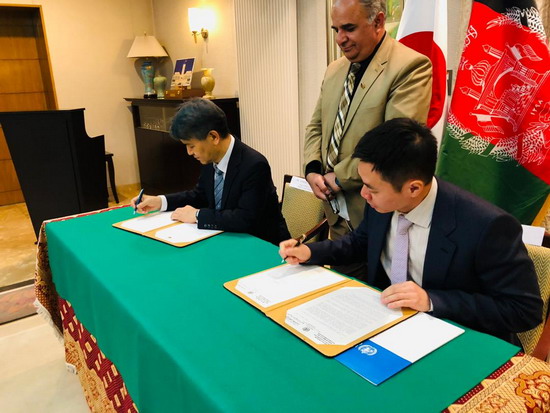 Kabul, Afghanistan, 15 March, 2021 – The Government of Japan has pledged approximately US$ 1.8 million (187 million Japanese Yen) for a project to strengthen the response capacity for infectious diseases in Afghanistan. Mr Takahashi Yoshiaki, Chargé d’Affaires ad interim of the Embassy of Japan in Afghanistan, and Dr David Lai, Representative, Officer in Charge of the WHO country office in Afghanistan, signed the agreement in the presence of His Excellency Dr Bashir Noormal, Deputy Minister of Policy and Planning of the Ministry of Public Health. The project will be implemented by WHO and the Japan International Cooperation Agency (JICA), in partnership with the Ministry of Public Health.
Kabul, Afghanistan, 15 March, 2021 – The Government of Japan has pledged approximately US$ 1.8 million (187 million Japanese Yen) for a project to strengthen the response capacity for infectious diseases in Afghanistan. Mr Takahashi Yoshiaki, Chargé d’Affaires ad interim of the Embassy of Japan in Afghanistan, and Dr David Lai, Representative, Officer in Charge of the WHO country office in Afghanistan, signed the agreement in the presence of His Excellency Dr Bashir Noormal, Deputy Minister of Policy and Planning of the Ministry of Public Health. The project will be implemented by WHO and the Japan International Cooperation Agency (JICA), in partnership with the Ministry of Public Health.
This grant will enable WHO and its partners to reduce avoidable mortality and morbidity that are associated with emerging and re-emerging infectious disease through enhancing diagnostic, surveillance and clinical services. The project will not only address current health needs associated with ongoing epidemics but will also strengthen the resilience of the health system to ensure preparedness for future health emergencies through investment in provision of medical supplies and equipment to health facilities and training of health workers. Helmand, Badghis and Daikundi provinces, as well as Afghans-Japan Hospital, will be supported through this fund, in which 3 new laboratories will be established and equipped with the GeneXpert technology to support the early detection of the COVID-19 and influenza.
“On behalf the Afghan people, I would like to thank the Government of Japan and commend its legacy of solidarity with the people of Afghanistan. We are grateful for the Government of Japan’s long-standing commitment to the health sector which is evidenced by investments made in supporting Afghanistan to eliminate tuberculosis and ongoing the support to the COVID-19 response. COVID-19 has shown us the importance of preparedness and standing united together in difficult times. The funding being provided under this project is yet another show of solidarity at a time when our country needs it the most,” said Dr Bashir Noormal, Deputy Minister of Policy and Planning.
“More seriously, these diseases tend to hit the most vulnerable group of people. That is the last thing we want to see, which naturally urged us to tackle this challenge,” said Mr Takahashi Yoshiaki, Chargé d’Affaires ad interim of the Embassy of Japan in Afghanistan.
“COVID-19 is a grim reminder how quickly health crises can push countries to the brink of catastrophe. While responding to the ongoing pandemic remains a key priority, it is also essential that we prepare the health system to quickly and effectively respond to future health emergencies arising from emerging and re-emerging infectious diseases. WHO is grateful for the generous support from the Government of Japan, which will play crucial role in enhancing the current capacity of the health system to cope with short and long term needs,” said David Lai, Officer In Charge, WHO.
Japan has been supporting Afghanistan’s nation-building efforts in various fields, including security, agriculture, rural development, human capacity development, education, health, infrastructure, culture and humanitarian assistance. The cumulative Japanese assistance to Afghanistan since 2001 amounts to approximately US$ 6.9 billion.
For more information, please contact:
Embassy of Japan in Afghanistan
Dr Mohammad Ibrahim
Mobile, +93 (0) 796 930 619
WHO country office
Bisma Akbar
Mobile: +93 (0) 782200354








